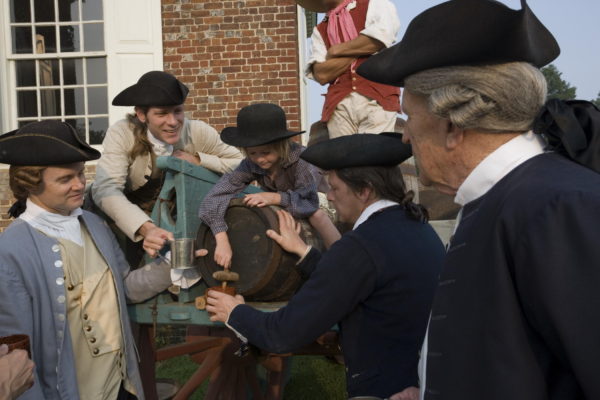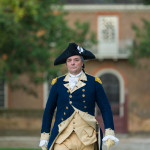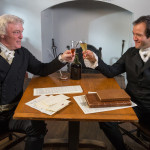
Did you know some candidates for public office used food and alcohol to convince citizens to vote for them? It’s true! While that’s not directly the case today, there are many similarities between voting in the 18th century and voting in the 21st century.
You know how voting works now. You drive to your polling station, which is set based on your home’s geographical location; walk to a table with your photo ID in hand (if your state has one of those laws on the books); and recite your name and address for the volunteer at the polling station. Sometimes you’ll get a paper slip to hand to another volunteer for an actual ballot. Other times you’ll head straight into your booth and get to work exercising your right to vote.
It hasn’t even been 100 years since women were granted that right. The 19th Amendment was ratified in 1920, just 96 years ago. That means there are women alive right now who were around when women couldn’t vote. Only 50 years prior, in 1870, the 15th Amendment was ratified, granting African American men the right to vote. Decades of oppression and the denial of this basic right led to the Voting Rights Act of 1965, signed into law by President Lyndon B. Johnson. I had the extreme honor of meeting a Civil Rights leader, Bernard Lafayette, during our Let Freedom Ring initiative this past February.
My first vote cast for a presidential candidate was in 2004. I have voted in every single election, no matter how small, because I understand that government truly starts at the local level. I have voted in four different cities in three states since I was old enough to do so, and found something different at each location. For example, in Suffolk, the ballots are electronic with a curtain at the booth, while the ballots in Williamsburg are paper and the only coverage you have are two short walls to your left and right. I remember being able to go into the voting booths with my parents when I was young and being extremely interested in the results the next morning when I woke up. Maybe that’s what sparked my love of politics.
Two or three centuries ago, the typical voter was a white man at least 21 years of age who owned land. In a city whose population was more than half African Virginian, including a significant number of white women and children, not to mention men who were of age but didn’t own land or 50 of personal property, this didn’t leave very many eligible voters (known as freeholders) for a candidate to woo here in Williamsburg.
If you turn on any cable news network or read any newspaper or online publication, you’ll find information about a new poll suggesting a candidate is favored more than another. Because we’re in a presidential election year, these polls are released more frequently. Our Commonwealth has been a battleground state for years, so naturally Virginia is one of a handful usually highlighted in these polls. Some say the polls are indicative of the election, and the media has sometimes unofficially declared a “winner” before an election day has even arrived. We’ve seen this succeed and fail in recent years. Charles S. Syndor’s book American Revolutionaries in the Making says “elections were often settled before they were held” in the 18th century, because groups and powerful men would often talk about their support of a candidate, just as it happens today. Interest groups and other politicians will stump for their candidate in hopes of convincing others to join their side. It’s also important to note that elections were only held for representatives from each county and Williamsburg in the colonial legislature in the 18th century.
Would you think men like George Washington would supply food and alcohol to potential voters in his home county in order to win their votes? Well, he did. In most cases, a picnic-like event was held for the public to attend, with a candidate footing the bill. What was the favorite drink and food item? Syndor said it was rum punch and ginger cakes as well as hogs.
Now, let’s do an exercise, shall we? I’d like you to close your eyes and imagine George Washington hosting a big picnic with rum punch and our beloved gingerbread cakes in abundance. What do you think the candidates would say as they addressed the crowd? Leave your ideas in the comments below!
There were others who wouldn’t stoop to such levels. One of those candidates was James Madison, who wanted to be elected by virtue only. Bryan Austin, the man behind our very own James Madison, explained:
“James Madison began his lasting political career with an enormous leap followed by an embarrassing stumble. After collaborating on the Virginia Declaration of Rights and Constitution with George Mason and Patrick Henry, and amending the 16th article to change religious toleration to the free exercise of religion, Madison was feeling like his career as a Revolutionary had no where to go but up. When the time came the following year to stand for office for the newly minted Virginia House of Delegates, Madison felt that after working to build the new government he was the obvious choice to represent Orange County.
“He was so confident, in fact, that he decided to shy away from the age old tradition of ‘treating,’ bribing the freeholders with Whiskey, Bumbo, and Rum, and instead decided on a more ‘chaste method of appointment’ appealing to the intellect and reason of the good people of Orange County. He lost horribly to a tavern keeper named Charles Porter, something he carried with him long after. Thankfully the statesmen of Williamsburg, remembering the potential of the bookish young revolutionary from the west, appointed Madison to the Governor’s council of State.”
Today, we’re enticed not with food and drink (for free, at least), but with free bumper stickers and buttons. As a former political journalist, I’ve been added to several campaign email lists that boast free items if you just give them a little bit of personal information, like your name, address, and phone number. This happens on both sides of the aisle.
“Campaign stops” existed in the 18th century, though not the same as they are now. In fact, George Washington was told in 1758 to make an appearance in Frederick County when he was standing for election to the House of Burgesses. Now, it’s harder to get a one-on-one meeting with a candidate, even at a state level. The population of America is just so much larger now than it was in the 18th century, when it was easier to meet with voters. Today, we have TV interviews and rallies to get us closer to the candidates, but even if you attend a rally, you’re not guaranteed a handshake.
On Election Day in Virginia, eligible citizens would cast their vote by voice, not by paper ballot. Voters would travel to a courthouse where “his name was called out in a loud voice, and the sheriff inquired how he would vote. The freeholder replied by giving the name of his preference. The appropriate clerk then wrote down the voter’s name, the sheriff announced it as enrolled, and often the candidate for whom he had voted arose, bowed, and publicly thanked him.” - Sydnor’s American Revolutionaries in the Making. Some men simply lived too far from a courthouse and would skip the vote.
We’re definitely not going to see the same thing now. Thankfully we do not have to travel as far to cast our votes, so it’s easier to “get out the vote,” and politics is still seen by many as a subject that shouldn’t be talked about personally. Votes are a private thing and one does not need to yell out who they are supporting. There are many family members of mine who I have no idea which side of the aisle they’re on because they never participate in political discussions.
Gen. George Washington is still encouraging you to practice your right to vote. He wants every single one of you to participate, debate, and vote this year and every year. Make sure you’re registered to vote and keep yourself informed of the candidates and issues. Do they stand for the things in which you stand? No matter if you are a member of a party or not, it’s important to get to the polls on Election Day.


Thanks for this excellent piece. We particularly appreciate Bryan’s insights.
We’ve shared it on our radio show’s web page: https://www.facebook.com/Your.Weekly.Constitutional/
Cheers!